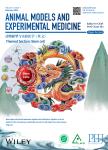Local transgene expression and whole-body transgenesis to model brain diseases in nonhuman primate
Local transgene expression and whole-body transgenesis to model brain diseases in nonhuman primate作者机构:Institut des Maladies NeurodégénérativesUniversity of Bordeaux CNRSInstitut des Maladies Neurodégénératives CHU BordeauxService de Biologie de la reproduction-CECOS
出 版 物:《Animal Models and Experimental Medicine》 (动物模型与实验医学(英文))
年 卷 期:2019年第2卷第1期
页 面:9-17页
核心收录:
学科分类:10[医学]
主 题:animal models neuroscience nonhuman primates
摘 要:Animal model is an essential tool in the life sciences research, notably in understanding the pathogenesis of the diseases and for further therapeutic intervention success. Rodents have been the most frequently used animals to model human disease since the establishment of gene manipulation technique. However, they remain inadequate to fully mimic the pathophysiology of human brain disease, partially due to huge differences between rodents and humans in terms of anatomy, brain function, and social behaviors. Nonhuman primates are more suitable in translational perspective. Thus, genetically modified animals have been generated to investigate neurologic and psychiatric disorders. The classical transgenesis technique is not efficient in that model; so, viral vector-mediated transgene delivery and the new genome-editing technologies have been promoted. In this review, we summarize some of the technical progress in the generation of an ad hoc animal model of brain diseases by gene delivery and real transgenic nonhuman primate.



